Cremation is a topic that raises curiosity when studying the customs of the Bible. Most Israelites practiced burial, believing it honored the body God created. However, there is one unique story in Scripture that mentions the burning of a body after death.
In exploring Who Was the First Person Cremated in the Bible?, we learn about an unusual event involving King Saul and his sons. Their cremation was not a common practice but an act of respect and protection, showing how love and honor sometimes shaped ancient traditions.
Historical Context of Cremation
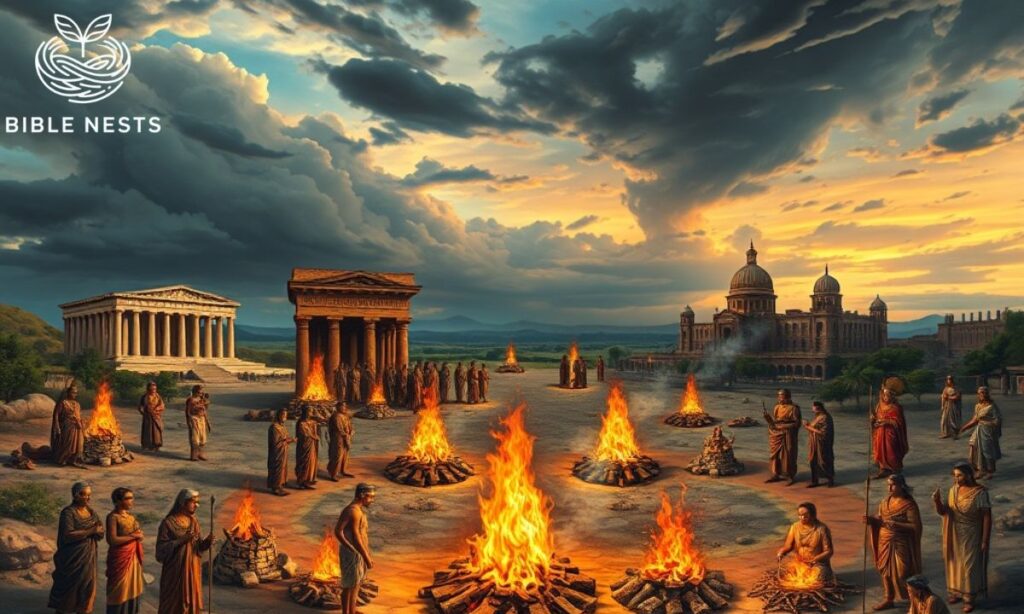
Cremation has ancient roots spanning thousands of years across diverse civilizations. Archaeological evidence reveals that the practice dates back to the Stone Age, with some of the earliest known cremations occurring around 3000 BCE in Europe and the Near East.
The ancient Greeks and Romans widely adopted cremation, viewing it as a dignified method of honoring the deceased, particularly for warriors and nobility who were cremated on elaborate funeral pyres.
The practice experienced significant fluctuations throughout history, influenced by religious and cultural shifts. During the rise of Christianity in the Roman Empire, cremation fell out of favor as burial became the preferred method, aligning with beliefs about bodily resurrection.
Who Was The First Person Cremated In The Bible? – Old Testament
The Bible does not explicitly record anyone being cremated in a religious or funeral sense during Old Testament times. However, the bodies of King Saul and his sons were burned by the men of Jabesh-gilead after they were killed by the Philistines at Mount Galba, as recorded in 1 Samuel 31:11-13.
This act was likely performed to prevent further desecration of their bodies by the Philistines, rather than as a traditional burial practice, since the Israelites typically preferred burial.
While this burning of Saul and his sons represents the closest instance to cremation in the Old Testament, it’s important to note that cremation was not a common Jewish practice. The Israelites generally viewed burial as the proper way to honor the dead, following examples like Abraham’s purchase of a burial cave for Sarah.
Fire was more commonly associated with divine judgment or the burning of executed criminals in biblical accounts
Who Was The First Person Cremated In The Bible? – Two Cities Of People
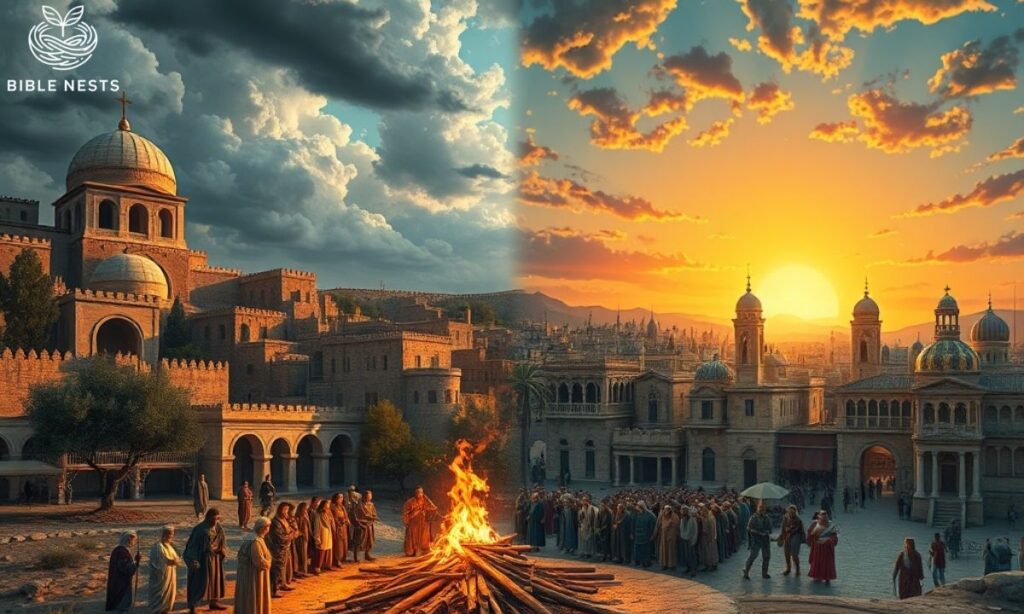
The first recorded cremation in the Bible involves Saul, the first king of Israel, and his sons who died in battle against the Philistines on Mount Gilboa. After their bodies were dishonored by being hung on the walls of Beth-shan, the valiant men of Jabesh-gilead retrieved them under cover of night.
They burned the bodies and buried the bones under a tamarisk tree, performing this act out of respect and to prevent further desecration. This unusual practice departed from typical Jewish burial customs but was done in extraordinary circumstances to honor their fallen king.
The concept of “two cities of people” reflects the biblical distinction between those who follow God’s ways and those who reject them, a theme running throughout Scripture.This separation represents two different destinies and two different communities—one aligned with God’s purposes and another living in opposition to His will.
Who Was The First Person Cremated In The Bible? – First Cremation
The first person cremated in the Bible was King Saul, along with his sons, as recorded in 1 Samuel 31:11–13. The men of Jabesh-gilead burned their bodies after battle to protect them from enemy humiliation, then respectfully buried their bones.
Genesis 19:24 – God Sent Fire To Destroy
The first mention of cremation in the Bible is found in 1 Samuel 31:11–13, where King Saul and his sons were burned after their deaths in battle. The men of Jabesh-gilead performed this act to protect their bodies from being dishonored by the Philistines.
Although cremation was uncommon among the Israelites, this instance was done out of deep respect rather than religious approval. It highlights how compassion and necessity sometimes influenced burial practices in ancient biblical times.
Genesis 19:28 – The Effects Of The Heavenly Fire
In Genesis 19:28, Abraham looked toward Sodom and Gomorrah and saw thick smoke rising from the land like a great furnace. This sight revealed the total destruction caused by God’s fiery judgment on the wicked cities.
The heavenly fire consumed everything, leaving behind only ashes and desolation as a warning of divine justice. It showed the severe consequences of sin and the power of God’s wrath against corruption and disobedience.
Cremation and the Catholic Church

The Catholic Church’s stance on cremation has evolved significantly over the centuries. While cremation was prohibited for Catholics until 1963, the Church now permits this practice under specific conditions. The revised Code of Canon Law allows cremation as long as it is not chosen for reasons contrary to Christian doctrine. However, the Church still expresses a preference for traditional burial, which better expresses hope in bodily resurrection.
When cremation is chosen, the Catholic Church maintains strict guidelines about the treatment of cremated remains. The ashes must be kept in a sacred place, such as a cemetery or church columbarium, and cannot be scattered, divided among family members, or kept in homes.
Who Was the First Person Cremated in the Bible? — Achan — The “Troubler of Israel”
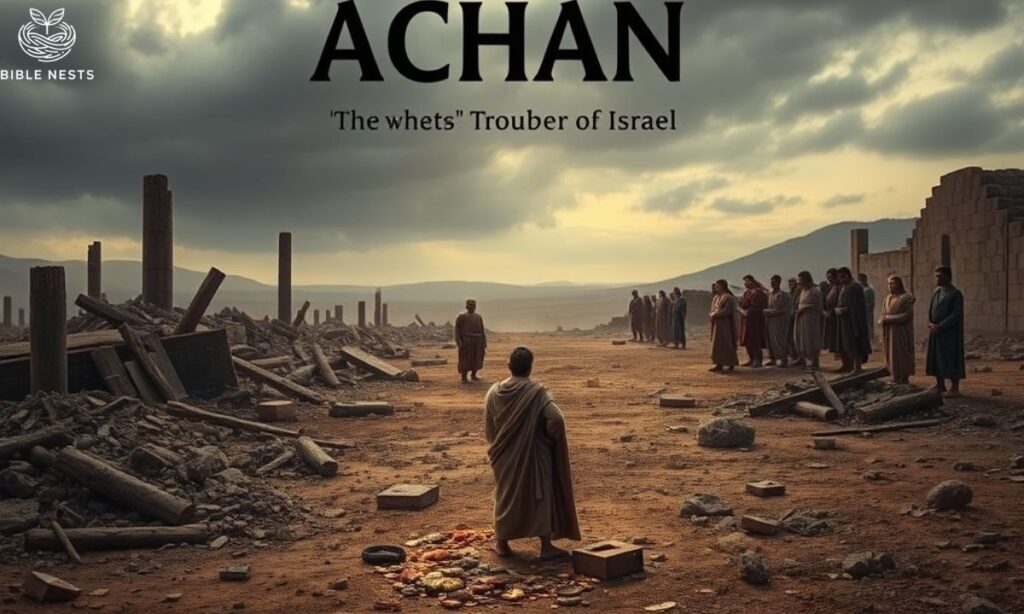
Achan holds the grim distinction of being the first person whose body was burned in the biblical narrative, though his case represents execution by fire rather than cremation as a burial practice. Following Israel’s victory at Jericho, Achan secretly took forbidden items from the city—a beautiful Babylonian garment, silver, and gold—directly violating God’s command that all spoils be devoted to destruction or the Lord’s treasury. His transgression brought defeat upon Israel at Ai, where thirty-six men died, prompting Joshua to seek the cause of God’s anger through a process of elimination by lots.
When Achan was identified as the culprit, he confessed to his sin, earning him the title “Troubler of Israel” (Achor means “trouble” in Hebrew). As punishment, Achan, along with his family and possessions, was taken to the Valley of Achor where the entire community stoned them to death, after which their bodies and belongings were burned with fire.
Who Was The First Person Cremated In The Bible? – The Body Of King Saul
King Saul’s death on Mount Gilboa marked one of the most tragic endings in biblical history, as Israel’s first monarch fell on his own sword after being severely wounded in battle against the Philistines.
The Philistines discovered his body along with those of his three sons, including Jonathan, and desecrated them by cutting off Saul’s head and fastening their bodies to the wall of Beth Shan as trophies of war.
When the valiant men of Jabesh Gilead heard what the Philistines had done to Saul’s body, they remembered how he had once rescued their city from Nahash the Ammonite at the beginning of his reign. Driven by loyalty and gratitude, these brave warriors traveled all night, retrieved the bodies from the wall of Beth Shan, and brought them back to Jabesh.
Upon returning to their city, the men of Jabesh Gilead burned the bodies of Saul and his sons, which was highly unusual for ancient Israelite burial customs that typically favored interment. After the burning, they took the bones and buried them under a tamarisk tree in Jabesh, fasting for seven days to honor their fallen king and his sons.
This act of cremation was likely motivated by the severe mutilation and decomposition of the bodies after being displayed publicly by the Philistines for an extended period.
The burning may have been seen as a merciful way to spare the family further indignity while also ensuring proper disposal of remains that had been dishonored, though the careful burial of the bones afterward demonstrated their respect for traditional burial practices.
Who Was The First Person Cremated In The Bible? – “Burnings”
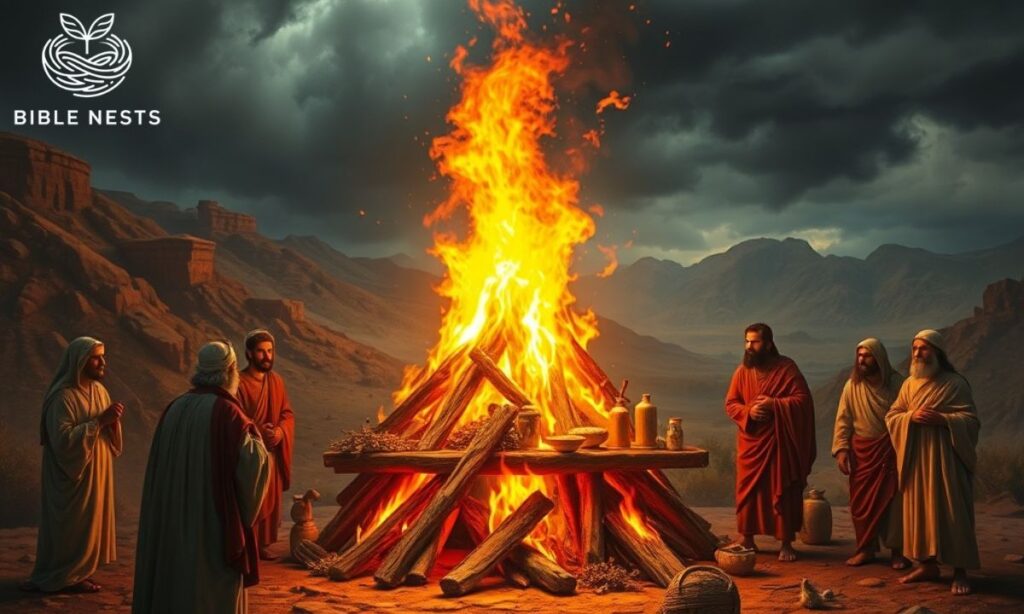
In the Bible, the term “burnings” often described acts of honor or mourning rather than actual cremation. Some kings, such as King Asa in 2 Chronicles 16:14, were given ceremonial burnings at their death, where fragrant spices and fires were used as part of the burial rites. These rituals reflected deep respect and reverence for the deceased rather than destruction.
The term “burning” is often associated with the funerals of ancient Israelite kings. Here are two instances—both of these kings were kings of Judah, showing that such burnings were royal traditions meant to express honor and remembrance.
2 Chronicles 16:14 – Good King Asa
King Asa, known as a righteous ruler of Judah, was honored greatly at his death. According to 2 Chronicles 16:14, he was laid in a tomb prepared for himself and surrounded with sweet spices and various kinds of perfumes. His people made a great burning for him, showing their deep love and respect.
This “burning” was not an act of cremation but a royal funeral ceremony filled with fragrant incense. It symbolized the people’s mourning and the honor given to a good king who had served God faithfully during his reign.
2 Chronicles 21:19 – Evil King Jehoram
Unlike his father Asa, King Jehoram of Judah was not honored at his death. According to 2 Chronicles 21:19, after suffering a painful disease, he died in great agony, and his people showed him no respect or mourning. There was no ceremonial burning made for him, as was done for the good kings before him.
This absence of a burning signified the people’s disapproval of his wicked reign. It showed that such “burnings” were acts of honor reserved only for righteous and respected rulers in ancient Israel.
Who Was The First Person Cremated In The Bible? -Idolatry And Human Sacrifice
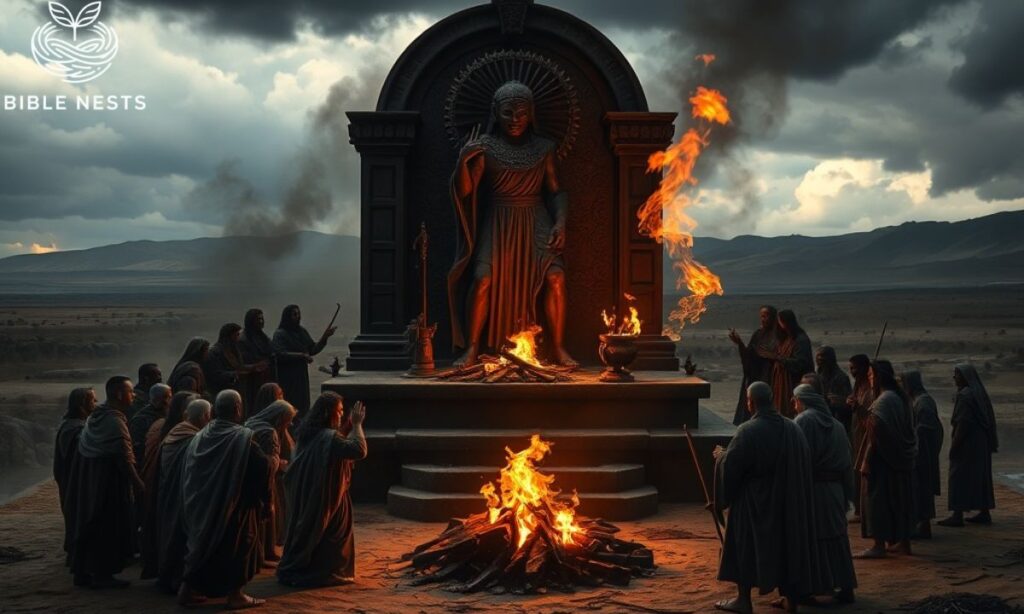
In the Bible, fire was often linked to idolatry and human sacrifice rather than true cremation. Pagan nations, especially those worshiping Molech, burned their children as offerings to false gods—acts God called abominations. These fiery rituals represented rebellion against God’s will and deep moral corruption.
Leviticus 18:21 – God Commanded Against Child Sacrifice
In Leviticus 18:21, God clearly forbade the Israelites from offering their children to the false god Molech. This command showed God’s deep concern for the sanctity of life and His rejection of the cruel practices of surrounding pagan nations.
The verse emphasized that such sacrifices defiled God’s holy name and corrupted His people. By condemning these acts, God reminded Israel to remain faithful and to worship Him in purity and righteousness.
Deuteronomy 18:10 – God Repeated His Warning Against Child Sacrifice
God reinforced His prohibition against child sacrifice in Deuteronomy 18:10, commanding that no one among His people should make their son or daughter pass through the fire. This repetition demonstrated the seriousness with which God viewed this sin and His desire to protect innocent lives from being destroyed in false worship. The warning came as Israel prepared to enter the Promised Land, where they would encounter nations practicing these horrific rituals, and God wanted to ensure His people would not be influenced by such evil.
2 Chronicles 28:3 – King Ahaz Sacrificed His Children As An Offering To A False God
King Ahaz of Judah turned away from the Lord and followed the detestable practices of the nations God had driven out before Israel. He burned his sons in the fire as offerings to pagan gods, directly violating God’s commandments and bringing great evil upon his kingdom.
His actions demonstrated how far the leadership of Judah had fallen into idolatry and how willing they were to sacrifice their own children to false deities in pursuit of worldly power and favor.
2 Kings 21:6 – King Manasseh Sacrificed His Son To A False God
King Manasseh, who reigned in Judah, committed numerous acts of wickedness including sacrificing his own son by making him pass through the fire. His reign was marked by extreme idolatry, witchcraft, and the shedding of innocent blood, provoking God’s anger more than any king before him. Manasseh’s actions represented the depths of spiritual darkness that had engulfed Judah, showing how even God’s chosen people could fall into the most heinous sins when they abandoned His ways.
Who Was The First Person Cremated In The Bible? – New Testament

The New Testament continues the biblical pattern of burial rather than cremation for believers who died in faith. When examining the deaths of early Christians and key figures in the New Testament, we find consistent evidence that burial was the accepted practice.
The apostles and early church followed Jewish burial customs, treating the bodies of the deceased with respect and dignity, anticipating the future resurrection of the body.
Matthew 14:12 – John The Baptist Was Buried
After John the Baptist was beheaded by King Herod, his disciples came and took his body and buried it, following the traditional Jewish practice of honoring the dead. Despite the tragic and unjust nature of his death, John’s followers ensured his body received a proper burial rather than being burned or disposed of disrespectfully.
This account demonstrates that even in circumstances of martyrdom and persecution, burial remained the normative practice for God’s faithful servants
Acts 5:9-10 – Ananias And Sapphira Were Buried
When God struck down Ananias and Sapphira for their deception and lying to the Holy Spirit, the young men of the church immediately carried out their bodies and buried them. The swift burial of both husband and wife followed Jewish custom and showed that even in cases of divine judgment, the community maintained respectful burial practices
. This incident in the early church reinforces that burial was the standard method of handling the deceased among believers.
Acts 8:2 – Stephen – The First Martyr Was Buried
After Stephen was stoned to death for his faithful witness to Christ, devout men carried him to his burial and made great lamentation over him. Even though Stephen died as a martyr under violent persecution, godly believers ensured he received an honorable burial according to Jewish tradition.
His burial by devout men demonstrated the early church’s commitment to treating the bodies of deceased believers with dignity and respect, regardless of the circumstances of their death.
Who Was The First Person Cremated In The Bible? – Burial or Cremation for the Christian Today?

For Christians today, the question of burial versus cremation is not explicitly commanded in Scripture, giving believers freedom to make decisions based on personal conviction, cultural context, and practical considerations.
While the biblical pattern consistently shows burial as the normative practice, cremation is not condemned in the New Testament, and many faithful Christians choose cremation for various legitimate reasons.
The key consideration for believers is that our hope rests not in the preservation of our earthly bodies but in God’s power to resurrect us, regardless of what happened to our physical remains.
Who Was The First Person Cremated In The Bible? – Jesus Christ — Our Perfect Example

Jesus Christ, after His crucifixion, was taken down from the cross and laid in a new tomb, following the Jewish burial customs of His time. His body was wrapped in linen cloth with spices, placed in a rock-hewn tomb, and sealed with a stone, demonstrating the importance of burial even for the Son of God.
Three days later, Jesus rose from the dead, leaving the tomb empty and proving His victory over death—this resurrection serves as the foundation of Christian hope that our bodies too will be raised, regardless of how they were laid to rest.
What Does the Bible Say About Cremation?

The Bible does not explicitly forbid cremation, though it consistently presents burial as the normative practice for God’s people throughout both Old and New Testaments. The instances of burning bodies in Scripture are typically associated with judgment, punishment, or pagan practices rather than honorable treatment of the deceased.
However, Christians today recognize that God is fully capable of resurrecting believers regardless of what happens to their physical bodies, whether through natural decomposition, cremation, or any other means, making this ultimately a matter of personal choice rather than biblical command.
Frequently Asked Questions
Who was the first person cremated in the Bible?
The first recorded cremation-like event in the Bible was that of King Saul and his sons in 1 Samuel 31:11–13.
Why were King Saul and his sons burned after death?
They were burned to protect their bodies from being dishonored by the Philistines after battle.
Was cremation a common practice in biblical times?
No, cremation was rare among the Israelites, who usually preferred burial.
Did God approve of cremation in the Bible?
The Bible doesn’t directly forbid or approve cremation but emphasizes respect for the dead.
What does the Bible say about burning bodies?
Burning bodies was often associated with judgment or punishment rather than a burial custom.
Who performed the cremation of King Saul?
The men of Jabesh-gilead retrieved and burned the bodies of Saul and his sons.
Where in the Bible is cremation first mentioned?
Cremation is first mentioned in 1 Samuel 31, during the account of Saul’s death.
Why did Israelites prefer burial over cremation?
They believed the body was created by God and should return to the earth naturally.
What was done with Saul’s remains after burning?
His bones were buried under a tree in Jabesh as a final act of honor.
What can we learn from the story of Saul’s cremation?
It teaches respect for the dead and shows that cremation was used out of necessity, not tradition.
Conclusion
The first person cremated in the Bible was King Saul, along with his sons, as recorded in 1 Samuel 31:11–13. The men of Jabesh-gilead burned their bodies out of respect and to protect them from the Philistines. This act showed loyalty and courage, not a change in burial customs.
Cremation was not common among the Israelites, who preferred burial as a sign of honor to God’s creation. Saul’s story reminds us that even in desperate times, people acted with love and respect for their leaders. It stands as a moment of honor in the face of tragedy.

Denzel is a passionate Christian writer with 4 years of experience in Bible and prayer blogging. He is currently sharing his inspiring spiritual writings on BibleNests.com, helping readers grow in faith and hope.
